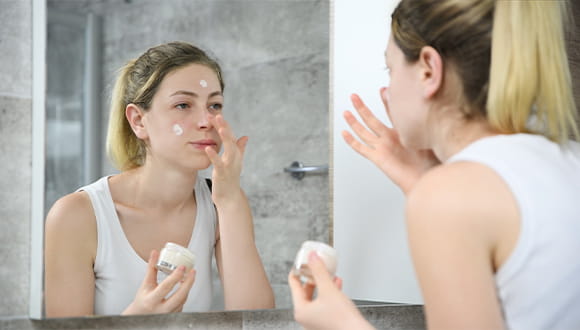Adult Acne in Women: What's Triggering Your Breakouts?
Nov. 17, 2020 - Sheshe GiddensWe've all been there. You've got a big presentation in front of your boss, or you're excited for that first date with the cutie you met at the coffee shop, but as soon as you look in the mirror, it hits you smack in the face: A breakout to end all breakouts. But you're an adult, not a teenager going through puberty! This isn't supposed to happen at this point in your life...or is it?
Acne is a common condition that affects teens and young adults. Sometimes, the problem may continue or even start well into adulthood. This is known as adult acne. Although adult acne can affect both men and women, far more women suffer from adult acne, though men tend to have more severe cases of it.
What causes adult acne?
Let's look at the basics to figure out what may be causing your adult acne breakouts.
Poor hygiene doesn't cause acne, although things like eating certain foods and smoking can make acne worse.
Acne is caused by your skin making too much sebum (oil), which, along with dead skin cells, clogs the pores — making them the perfect place for bacteria to grow. Hormones, family history and underlying health conditions can play a role in developing acne. It can also be a side effect of taking certain medications.
When do your acne breakouts occur?
It is common for some women to experience acne in their 30s, 40s and 50s for the first time — having never had it during their teens. This is referred to as adult-onset acne.
If you are suddenly experiencing acne, look for a pattern:
- Do you have breakouts around your period?
- Are you pregnant?
- Did you recently start or stop taking birth control pills?
- Are you approaching menopause?
According to the American Academy of Dermatology Association, you can thank your fluctuating hormones for these outbreaks. These fluctuations increase the amount of sebum produced in your skin.
Where are your pimples popping up?
We often think of the T-zone as the main area for acne breakout, since the forehead, nose and chin are notorious for pumping out lots of sebum in acne-prone skin. But there are other areas of the face that experience acne breakouts. And where those breakouts occur may shed light on the source of the problem.
Do you have acne on your cheeks?
Acne on your checks may indicate that you are rubbing your face up against something like the rim of your glasses, a cell phone or a pillowcase.
Do you have acne around your hairline?
The oil buildup in the hair and skin can cause acne to appear in the hairline. Also, oily hair products and makeup can buildup in the hairline, causing acne breakouts in that area.
Are you breaking out around your jawline?
Acne around the chin and jawline indicates hormonal acne, which is commonly triggered by hormonal fluctuations that occur around a woman's period, her pregnancy and as she approaches menopause.
Tips for dealing with acne breakouts
- Before you succumb to the urge to pop the big one with the whitehead and then conceal it with makeup — stop! Don't do it. Popping zits will only make your acne worse and possibly create permanent scarring. And please don't start Googling pimple-popping videos so that you can figure out how to do it "right." Leave it alone. This isn't something you want to DIY.
- Unfortunately, acne can create scars, so it's important to wear sunscreen to lessen hyperpigmentation (darkening) of those scars.
- Be gentle with your skin. Avoid harsh scrubbing and overwashing your face.
- Wash your face twice a day, and then use an oil-free, noncomedogenic (won't clog your pores) moisturizer. Although it may seem counterintuitive to add moisture to oily skin, dry skin actually triggers the production of more sebum and you may end up with a greasy-looking face and more breakouts.
- Thoroughly remove any makeup from your face as soon as possible. And remember to clean your makeup brushes regularly. They can easily harbor bacteria.
- Change your pillowcase often. Oil from your hair and face ends up being absorbed into the fabric and then you lay on it again, night after night — depositing more oil onto the pillowcase and then back onto your skin.
Need care now?
Houston Methodist Virtual Urgent Care offers on-demand video visits from wherever you are, no appointment needed. Our board-certified providers are available 24/7 to address many common health issues.











